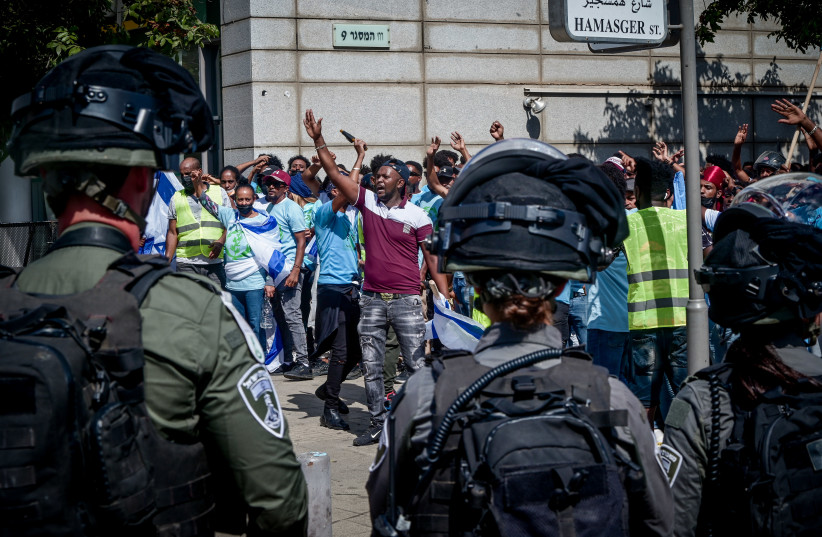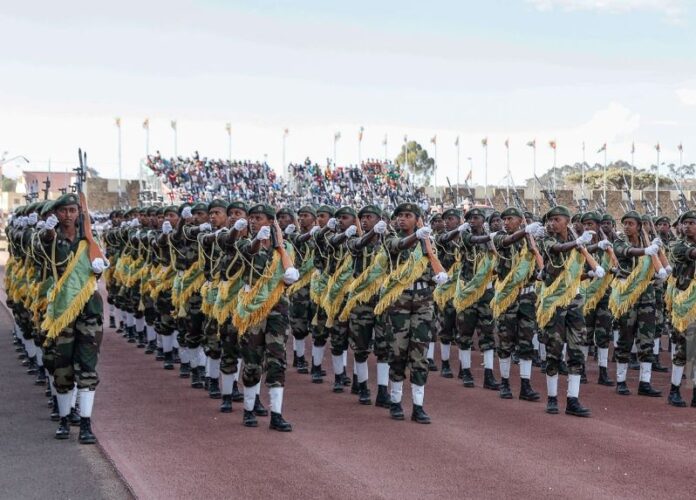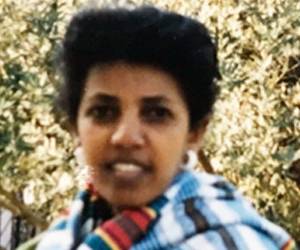The anti- and pro-Eritrean regime protesters have come head-to-head in Tel Aviv, but what is the conflict about?

Police guard while Eritrean asylum seekers who oppose the regime in Eritrea protest outside a conference of regime supporters in south Tel Aviv, September 2, 2023
Israel is home to some 30,000 refugees, around 90% of whom are seeking asylum from Eritrea or Sudan.Of those thousands, less than 1% of those refugees are recognized by the state of Israel, contributing to one of the lowest refugee acceptance rates in the Western world. This is despite the nation ratifying the United Nations Refugee Convention of 1951 and its Protocols of 1964.
Eritreans make up the majority of Israel’s population of African asylum-seekers, fleeing from a nation referred to as the “North Korea of Africa,” for reasons beyond the dictatorship of 77-year-old President Isaias Afwerki, who has been in power since 1993. The nation boasts obligatory (forced) military enlistment, listed as slavery-like conditions by the United Nations Human Rights Council, Amnesty International, and other human rights groups.
After Afwerki took power as Eritrea gained independence from neighboring Ethiopia, Eritrea immediately became a place where people could not come and go as they pleased. In addition to no free media nor free elections, the nation requires exit visas for anyone wishing to leave the country.Top ArticlesRead More
Rothman looks to ban Israel’s top justice from judicial reform hearing
Even if they had something to help them leave the country, they would not actually be able to without a visa to do so. With forced military service that has no end date, staying in the country does not provide any resident with good options.
It is also important to note that being an Eritrean refugee does not automatically make a person anti-regime. Though many are, there are a handful of refugees from Eritrea who, due to their support of the government would not qualify for refugee status according to the United Nations Human Rights Convention, it’s all the same in the eyes of Israeli authorities.
Why would pro-regime Eritreans be in Israel?
Other reasons why someone who is pro-regime would be in Israel rather than back home in Eritrea include a lack of religious freedom, with specific religious groups being stripped of citizenship. According to a report by the United States Human Rights Commission, Jehovah’s Witnesses were stripped of their citizenship in 1993 and are not allowed to exercise basic rights.
In addition, whether someone is for or against this government, they are still subject to the human rights violations that have caused so many to flee for fear of their lives. The United States Commission on International Religious Freedom has recommended Eritrea be designated as a Country of Particular Concern since 2004, and the United States has implemented strict sanctions against the country since 2002.
Those living in the Eritrean diaspora are also subject to the national Recovery and Rehabilitation tax – expecting those living outside of the country to pay 2% of their income toward government expenses.
According to information provided by the African Refugee Development Center, an Israeli NGO that provides resources to Tel Aviv’s African asylum seekers, Israel upholds the principle of non-refoulement, acknowledging that some asylum seekers are in danger if returned to their home countries. In turn, the state policy toward these asylum seekers is one of temporary non-deportation, officially referred to as “group protection,” according to the organization’s website.
“The only right this status gives them is a temporary stay on deportation, and they must renew their visas every 3-6 months. Additionally, the state has employed various tactics to coerce asylum seekers into “choosing” to leave on their own, including detention, limited access to medical care, and withholding of wages,” the organization writes.Saturday’s events could lead to deportation for many, ultimately sending them to their deaths.
However, Israeli authorities received ample warning by the Eritrean community that allowing the event to happen would have dire consequences. A letter penned by Tel Aviv’s Eritrean church leaders cited that social media and previous events led them to believe the tension caused by this event could cause a violent outbreak – as it had previously.
“The organizers of the event are trying to transfer an internal political dispute in Eritrea to other countries in the world with communities of Eritreans,” the letter read, citing similar outbreaks in other Western countries like the Netherlands, the US, and Canada, many of which have banned these events from taking place following violent outbreaks.“In light of the above, with the aim of preventing passions that a storm may cause, God forbid, we, unfortunately, ask that this planned event not be allowed to take place,” they pleaded.
But instead, Israeli police did not take precautionary measures. Blockades were destroyed and the fate of refugees and their communities lay in the hands of a government that refers to them as “infiltrators.”
Much like the aforementioned comparison to North Korea, Eritrea has several sanctions against the small nation in the Horn of Africa. While lacking nuclear arms, the small nation has had many arms embargoes set against them. The nation picks fights with neighbors, and unlike North Korea, those who leave may return on the condition that they pay their diaspora tax. The nation may have some uncensored satellite television, though the Internet is not uncensored.
The Economist reported that the two nations do have similarities that cannot be ignored. “Both are one-party states whose rulers lock up (or kill) their critics while preaching the virtues of ‘self-reliance,’” their report read, adding that “both are closed economies with almost no private sector, though Eritrea’s ruling People’s Front for Democracy and Justice no longer identifies itself as communist.
Israeli NGO Hotline for Refugees and Migrants also responded to Saturday’s events. “Israeli police fired at protesters in the heart of Tel Aviv. For a whole week, the representatives of the Eritrean leadership contacted the police in an attempt to cancel the embassy event and prevent the collision. The police ignored them, and now they are firing stun grenades and sponge balls at them,” the organization said in a statement.
“The demonstrators wanted to protest the blatant interference of the Eritrean embassy in the lives of those who fled the brutal dictatorship. Eritrean embassies around the world are chasing the asylum seekers, and in other countries embassy events have been canceled precisely because of the fear of flare-ups as we see before our eyes now. This bloody failure could and should have been prevented.”
Regardless of on which side Eritreans in Israel stand politically, the national living conditions make it nearly impossible to live in peace without fear for personal safety – and beyond.
Source: https://www.jpost.com/israel-news/article-757331



